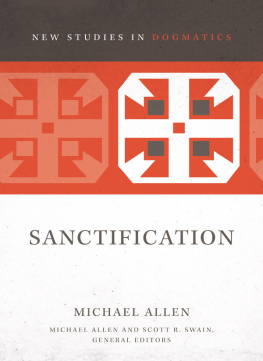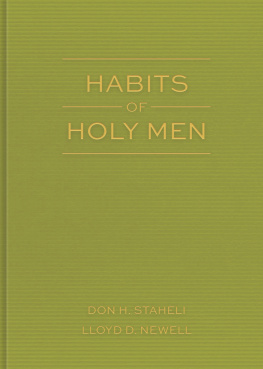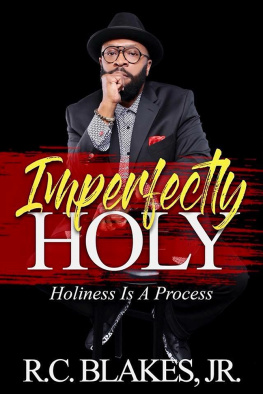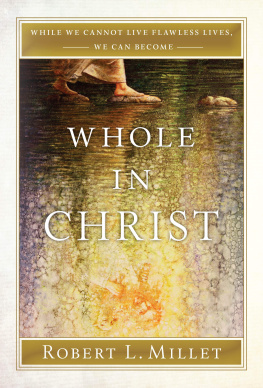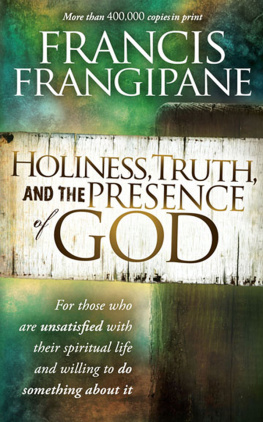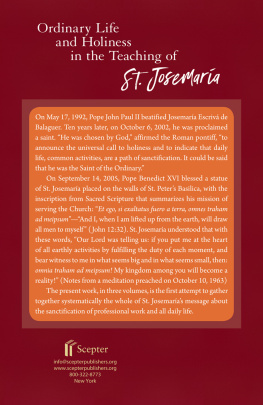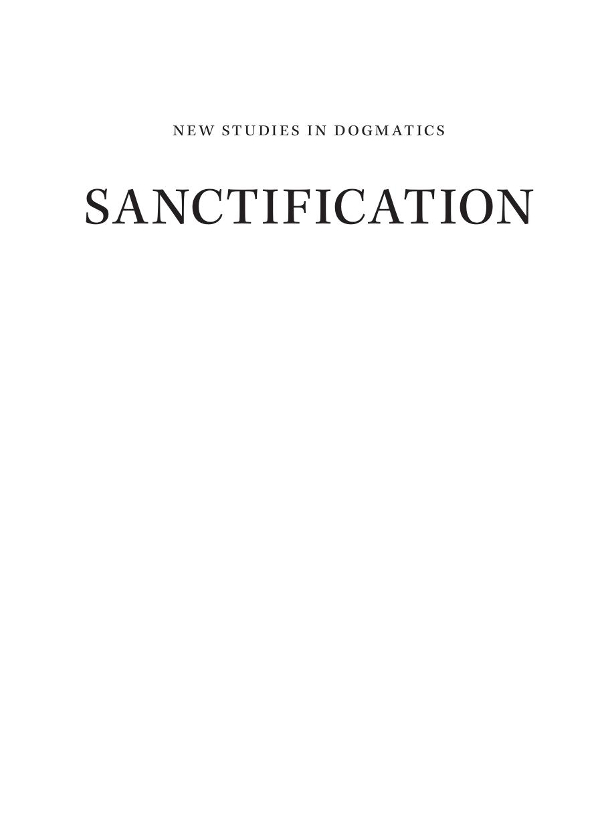PRAISE FOR SANCTIFICATION
Here is learned and extensive dogmatic exposition in the grand old European academic style. Weaving together both biblical and systematic theological perspectives, Professor Michael Allen leads us, his students, in a genuine theological discussion rooted in wide reading and mature reflection. Sanctification thus points us beyond a bare textbook-style accumulation of information to the higher goal of a genuine knowledge of God and transformation into the image of Christ. A very worthy addition to what already promises to be an impressive series.
Sinclair B. Ferguson,Chancellors Professor of Systematic Theology, Reformed Theological Seminary
Michael Allen believes that the gospel is large enough to cover not only the guilt but the dominion of sin. This volume gives further evidence of the authors reliability as a faithful steward of the mysteries of God. Learn, mark and inwardly digest this rich feast.
Michael Horton,J. Gresham Machen Professor of Systematic Theology and Apologetics Westminster Seminary California
Allen delivers a work of classical Reformed theology. He irenically differentiates the Reformed position on sanctification from some Lutheran positions, through careful biblical exegesis and retrieval of Calvin, Augustine, Berkouwer, and others. From a more traditionally Reformed perspective, Allen here inherits the mantle of John Webster. As a Catholic, I am deeply grateful for Michael Allens vision, with the ecumenical conjunctions that it reveals.
Matthew Levering,James N. and Mary D. Perry Jr. Chair of Theology, Mundelein Seminary
Holiness is good news, Allen reminds us, for sanctification is all about God sharing his own holiness with us in Christ. As he unpacks this gospel of holiness, Allen presents a marvelous minor dogmatics, ranging through a variety of doctrines, and grounding our holiness in the one and only place where it must originatethe eternal being of God himself. Steeped within Reformed catholicity, Allens biblical retrieval draws from a wide range of sources: patristic, medieval, and modern. The result is an irenic and deeply thoughtful book.
Hans Boersma,J. I. Packer Professor of Theology, Regent College
One of the great strengths of Michael Allens work is that he resists the temptation of treating sanctification in isolation; instead, he calls attention to how this vital doctrine draws upon and informs a multitude of other doctrines. Consequently, Allen provides a rich and distinctive account of holiness that certainly deserves our attention and thanks.
Kelly M. Kapic,professor of theological studies, Covenant College
In Sanctification, Michael Allen presents a lucid dogmatic portrait of the glorious mystery of new life in Christ. Allens book offers a feast for readers to feed upon this truth. Framed in conversation with the best of contemporary scholarship, Allen brings together scriptural exegesis, patristic and Protestant commentary, and wide-ranging theological exposition. Sanctification is a model of biblical, Reformed catholicity, which both breaks new ground and retrieves insights from the past. Highly recommended for students, scholars, and others who hunger for a theological account of sanctification in Christ!
J. Todd Billings,, Gordon H. Girod Research Professor of Reformed Theology, Western Theological Seminary
SERIES EDITORS
Michael Allen, John Dyer Trimble Professor of Systematic Theology and Academic Dean, Reformed Theological Seminary, Orlando, Florida, USA
Scott R. Swain, President and James Woodrow Hassell Professor of Systematic Theology at Reformed Theological Seminary, Orlando, Florida, USA.
ADVISORY BOARD
John B. Webster, Professor of Divinity, St Marys College, University of St Andrews, Scotland, UK
Kevin J. Vanhoozer, Research Professor of Systematic Theology, Trinity Evangelical Divinity School, Deerfield, Illinois, USA
Katherine Sonderegger, Professor of Theology, Virginia Theological Seminary, Alexandria, Virginia, USA
Henri Blocher, Professor of Systematic Theology, Facult Libre de Thologie vanglique, Vaux-sur-Seine, France
ZONDERVAN EDITORIAL ADVISOR
Katya Covrett, Executive Editor, Zondervan Academic
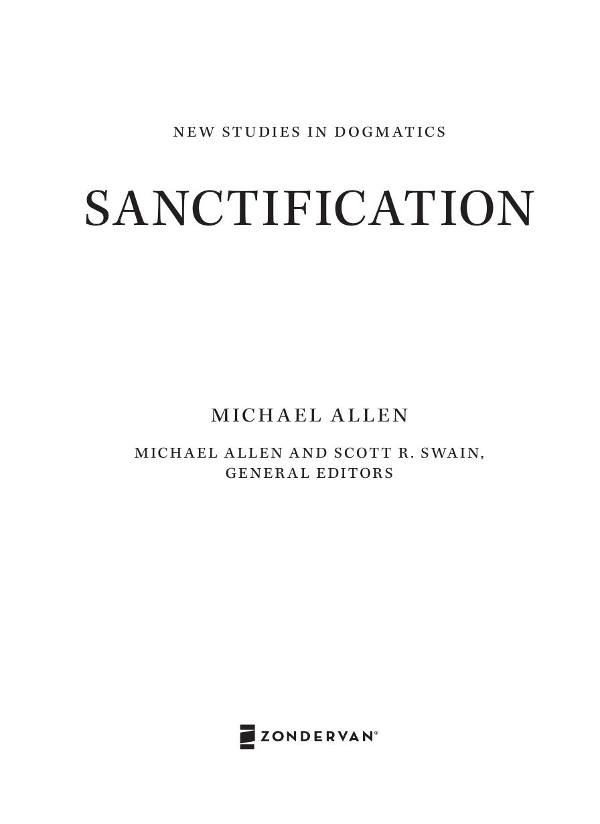
ZONDERVAN
Sanctification
Copyright 2017 by Michael Allen
Requests for information should be addressed to:
Zondervan, 3900 Sparks Dr. SE, Grand Rapids, Michigan 49546
ePub Edition September 2017: ISBN 978-0-310-49147-7
All Scripture quotations, unless otherwise indicated, are taken from the ESV Bible (The Holy Bible, English Standard Version). Copyright 2001 by Crossway, a publishing ministry of Good News Publishers. Used by permission. All rights reserved.
Scripture quotations marked NRSV are taken from the New Revised Standard Version Bible. Copyright 1989 National Council of the Churches of Christ in the United States of America. Used by permission. All rights reserved.
Any Internet addresses (websites, blogs, etc.) and telephone numbers in this book are offered as a resource. They are not intended in any way to be or imply an endorsement by Zondervan, nor does Zondervan vouch for the content of these sites and numbers for the life of this book.
All rights reserved. No part of this publication may be reproduced, stored in a retrieval system, or transmitted in any form or by any meanselectronic, mechanical, photocopy, recording, or any otherexcept for brief quotations in printed reviews, without the prior permission of the publisher.
Cover Design: Micah Kandros
Interior design: Kait Lamphere and Denise Froehlich
17 18 19 20 21 /DHV/ 10 9 8 7 6 5 4 3 2 1
In memoriam J. Knox Chamblin.
Information about External Hyperlinks in this ebook
Please note that footnotes in this ebook may contain hyperlinks to external websites as part of bibliographic citations. These hyperlinks have not been activated by the publisher, who cannot verify the accuracy of these links beyond the date of publication.
CONTENTS
New Studies in Dogmatics follows in the tradition of G. C. Berkouwers classic series, Studies in Dogmatics, in seeking to offer concise, focused treatments of major topics in dogmatic theology that fill the gap between introductory theology textbooks and advanced theological monographs. Dogmatic theology, as understood by editors and contributors to the series, is a conceptual representation of scriptural teaching about God and all things in relation to God. The source of dogmatics is Holy Scripture; its scope is the summing up of all things in Jesus Christ; its setting is the communion of the saints; and its end is the conversion, consolation, and instruction of creaturely wayfarers in the knowledge and love of the triune God until that knowledge and love is consummated in the beatific vision.
The series wagers that the way forward in constructive theology lies in a program of renewal through retrieval. This wager follows upon the judgment that much modern theology exhibits a stubborn tendency to grow not higher but to the side, to borrow Alexander Solzhenitsyns words from another context. Though modern theology continues to grow in a number of areas of technical expertise and interdisciplinary facility (especially in both the exegetical and historical domains), this growth too often displays a sideways drift rather than an upward progression in relation to theologys subject matter, scope, and source, and in fulfilling theologys end. We believe the path toward theological renewal in such a situation lies in drawing more deeply upon the resources of Holy Scripture in conversation with the churchs most trusted teachers (ancient, medieval, and modern) who have sought to fathom Christs unsearchable riches. In keeping with this belief, authors from a broad evangelical constituency will seek in this series to retrieve the riches of Scripture and tradition for constructive dogmatics. The purpose of retrieval is neither simple repetition of past theologians nor repristination of an earlier phase in church history; Christianity, at any rate, has no golden age east of Eden and short of the kingdom of God. Properly understood, retrieval is an inclusive and enlarging venture, a matter of tapping into a vital root and, in some cases, of relearning a lost grammar of theological discourse, all for the sake of equipping the church in its contemporary vocation to think and speak faithfully and fruitfully about God and Gods works.

